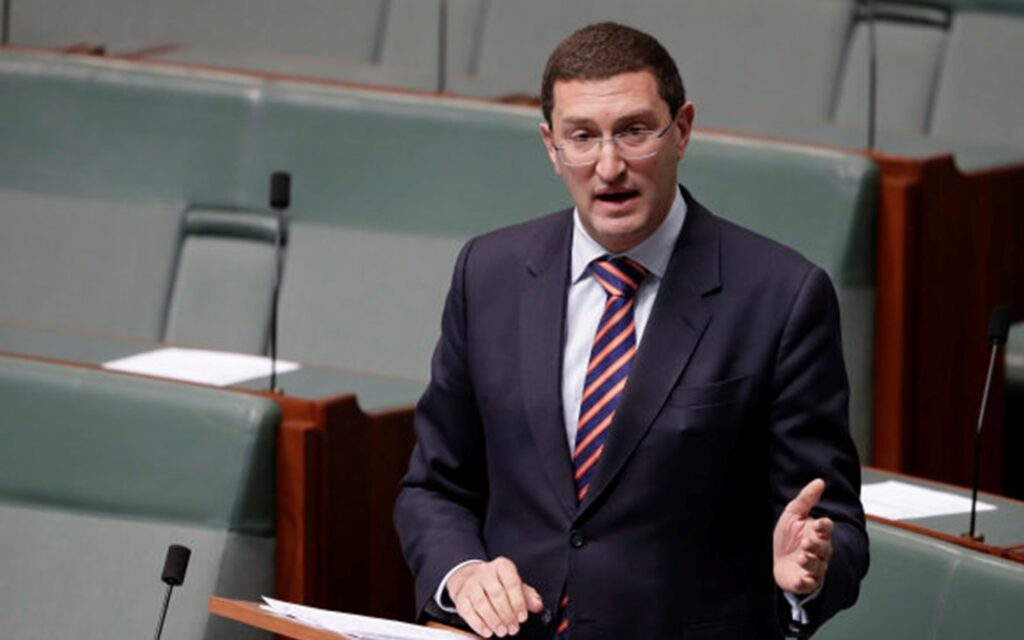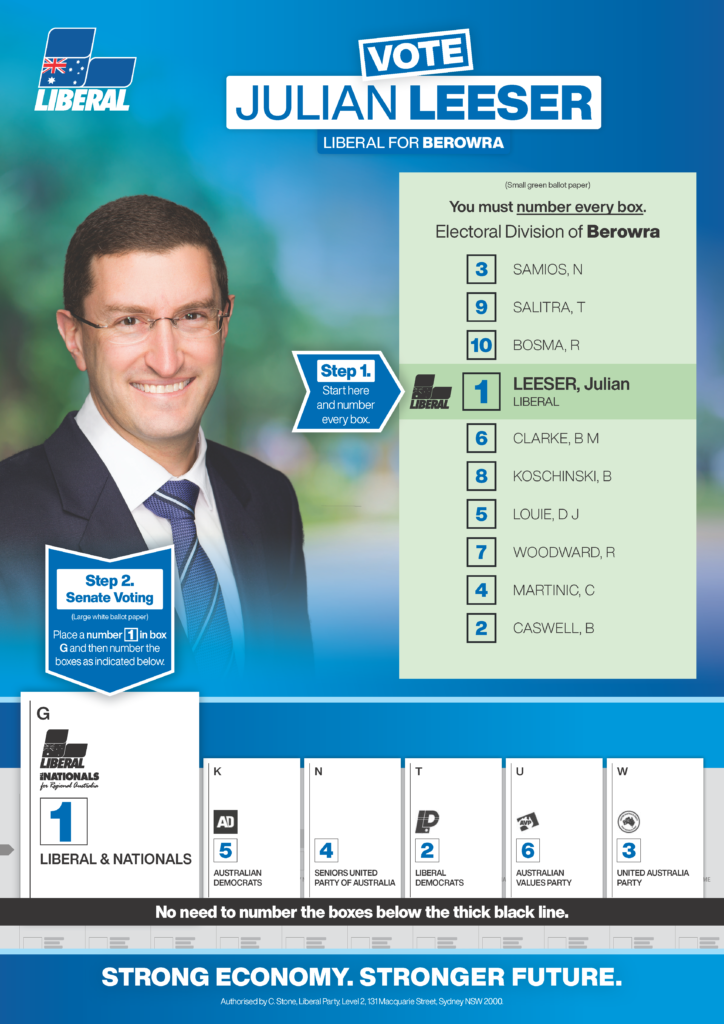Australians face scams every day—scams that are there to deceive Australians.
The scammer makes a promise to give something or to do something or pretends to be something other than what they are. Often they deceive people into believing that the scammer is actually helping them.
Despite the red flags, the scammer keeps promising there’s nothing to fear and there’s nothing wrong. People put their trust in the scammer, and then it’s too late: the scammer has taken them for a ride and disappeared.
Today we’re not debating an online scam but an electoral scam.
Anthony Albanese promised the stage 3 tax cuts over 100 times. Labor had voted for these tax cuts in this parliament. The tax cuts were taken to the Australian people by both sides.
In 2019, under Bill Shorten, Labor was very honest about its tax plans, and Australians rejected them. Had Labor under Anthony Albanese in 2022 been as honest, they may have been rejected again.
But Australians believed Labor, and they believed Anthony Albanese when he said, ‘My word is my bond.’ Then his word wasn’t his bond and he pocketed $28 billion in extra taxes.
To be fair to the Prime Minister, he wasn’t the only one. His ministers all lined up to celebrate the broken promise. The teals also broke their promises.
I’ve heard many of their arguments. The word ‘fairness’ comes up a lot.
Do you know what the fairest thing you can do is? Keep your word and keep your promises to Australians.
Australians are right to feel disappointed in a Prime Minister and in a government that says one thing and does another.
Australians have learnt that you can’t trust the Labor Party when it comes to taxes.
Paul Keating had his l-a-w law tax cuts that were never delivered, and Julia Gillard said there would be no carbon tax under the government she led.
Now Anthony Albanese has broken a word which he once said was his bond.
No-one questions that Australians are facing difficult times. Because of this government, Australians are facing the most financial pressure since the Keating recession of the 1990s.
True, unemployment continues at historic lows; yet the economic hamster-wheel is getting faster and faster.
Under this government, real net disposable income per person has fallen 8.6 per cent. The official figures reflect what Australians are feeling in their wallets.
Under this government, food’s gone up nine per cent, electricity’s up 23 per cent and gas is up 29 per cent.
This is despite the fact that we have a Prime Minister who’d promised to reduce power bills by $275.
And it’s the home where the pain is. For home owners, it’s the pain of a dozen interest rate rises under this government, meaning that a family with a $750,000 mortgage are paying an extra $24,000 a year.
Renters—who are often young or the most economically vulnerable—are feeling the pain of the largest increase in almost 15 years.
Bracket creep, interest rate increases, energy costs, inflation and falling real wages have all taken their toll.
For an average income earner, this is a decline in take-home pay of the order of $8,000. It’s worth recording that, under Labor’s policy, a worker on an average wage would receive only $804 a year—a fraction of what they lost.
It must be noted that, under this package, in its entirety, taxpayers lose. Labor’s tax package increases the tax take over 10 years by $28 billion.
We know that this tax package is a test case for Labor breaking further promises after the next election.
Over the last two years, we have seen very deliberate language around the stage 3 tax cuts: ‘There are no plans;’ ‘It’s legislated;’ ‘Our position hasn’t changed’—cute forms of words, always delivered with a touch of indignation when the ministers or the Prime Minister would be questioned.
Now we’ll hear the same form of words for negative gearing, for superannuation, for family trusts and for death duties over the next 18 months.
The opposition knows how much Australians are hurting. It’s why we will not stand in the way of these tax cuts.
But Australians are paying a terrible price for the inflationary largesse of state, territory and federal Labor governments and the lack of any long-term economic plan from the Treasurer.
I applaud people studying and learning. The Treasurer might have studied and written a thesis on the reforms of the eighties and nineties—and I applaud that, too; I really do—but he hasn’t done any thinking about the 2020s and the 2030s.
We must look forward, not look back.
Today, I want to add two reflections to this debate about where we’re heading. The first is that we need to recentre the economic debate of this country on the matters that will grow and prosper Australia.
All too often we’ve let the economic policy levers be driven by a desire to alleviate economic symptoms Australians face, rather than to address the causes.
This is a government focused on dishing out panadol for pain rather than surgery for a cure. It’s about winning a news poll rather than building for a generation.
Let’s speak the truth that too few want acknowledged. The Australian economy’s not working as it should. The fact that Australian wages aren’t buying as much as they used to is not a cause of our economic malaise; it’s a symptom. It’s a symptom of our loss of competitiveness and productivity.
The fact that power bills are going up and up won’t be answered by temporary relief, but by a reform of energy markets and a serious debate about our energy mix where nothing, including nuclear power, is off the table.
There’s the fact that investment in major projects is being stymied because this government has fed and encouraged activist groups. Lawfare is stymieing jobs, investment, productivity and national income.
The Attorney-General won’t resolve issues around legal standing, which is enabling political activists to disrupt the economic progress of this country.
There’s also a truth whispered among parents. Though most of them love their children’s school and appreciate the care and dedication of their teachers, there’s a deep fear our education system—primary, secondary and tertiary—is not preparing young people for the workforce they will face.
Australia’s skill needs are not being met. In so many places we’ve settled for a status quo economy that worked for the 1980s but is not working for the 2020s and will fail in the 2030s.
Our biggest businesses—be they supermarkets, telcos, banks or airlines—are settled up in cosy relationships which hinder growth and innovation.
We need the ACCC to continue to put the supermarkets, the telcos, the banks and the airlines under the microscope, studying market structure, barriers to entry and how we can encourage more market players.
Competition drives prices down and it drives innovation up. And we need a workplace relations system that doesn’t treat those who create jobs like enemies and criminals instead of partners in building a positive, high-wage economy. We need to reset the economic discussion and build for a new economic future.
Policies are always underpinned by values, and those values matter.
When it comes to the economy, we must always encourage aspiration, because it’s aspiration that encourages every Australian to participate, to contribute, to give it a go and to do their best.
Aspiration is a virtue. It’s the optimism expressing itself through our labour, which is the gift we all bring to our workplaces.
From young people contemplating decisions about skills and study, to older people thinking about taking on extra work, aspiration matters.
When an Australian makes a decision that the effort isn’t worth it, we all lose.
We lose when a small-business person decides expanding their business is not worth the stress and the paperwork. We lose when a talented leader decides to base themselves overseas, and we lose when a businessperson chooses to invest offshore rather than in Australia.
The stage 3 tax cuts were a major economic reform.
They were designed to end bracket creep as well as provide a way to challenge government to live within its means—to focus on growing the economy rather than stifling it. It meant taking away the tax penalties middle income earners faced when getting a new job or expanding a small business.
But deeper than any concern I have about the value these tax cuts have for Australia is my concern about the way this government is attacking the idea of aspiration. The government believes its future pathway to success is an embrace of a class-war outlook rather than long-term reform.
The problem with Labor’s class-war vision, which always pits one group of Australians against another, is that it’s removing the incentive to work harder, to take a risk and to grow.
Our job in this place is to unleash Australians—not to continue to look for ways to hold them back. That’s for everyone, from young people entering the workforce to older Australians contemplating retirement.
I’m reminded of a visit I had before Christmas from an 18-year-old named Emma, who’d just completed her HSC. I spoke about Emma recently at the Young Liberal National convention.
Emma embodies aspiration but wonders if the economy still works for young people.
Emma has just finished her HSC and has been accepted into midwifery at the University of Newcastle. She hopes to transfer to medicine there after finishing her degree.
In high school, Emma saved for a car, because she lives in an area of my electorate that is not well served by public transport. There wasn’t enough money in the family budget for another car, so she worked three jobs, she saved, and she bought her car.
Then she had to fund the petrol, the rego, the insurance, the servicing and all the general running costs. With petrol on the up and up and some unexpected repairs, Emma found herself at the end of high school with no savings and seriously questioning what was ahead.
That is many years of HECS, the cost of living away from home and the realisation that, even if everything goes according to plan and she becomes a doctor, it may be many years before she gets the money for a deposit for a home.
She said to me: ‘I don’t want to be 30 or 40 and living in my mum’s basement. My mum has done so much for me, and I don’t want to leech off her forever.’
I thought to myself: ‘Here is someone who’s smart. Here’s someone who’s motivated, with great values, who is about to start her studies, and even she’s lost confidence in our economy to deliver.’
I acknowledge, of course, that Emma will get a tax cut. But the bigger issues around housing, incomes and job security aren’t being faced by this government.
And what of the Australia Emma will inherit as she enters the full-time workforce as a medic in the 2030s? Will it be one where her effort will be rewarded, or will she be waved down and held back by tax scales that punish middle-income earners?
Australians are suffering under a government with no economic plan.
These tax changes offer many Australians some temporary relief. My concern is that, without economic reform and a culture committed to encouraging effort and aspiration, Australia and Australians will continue to go backwards.
The temporary relief is welcome, but this government needs to make changes to make our economy stronger.




